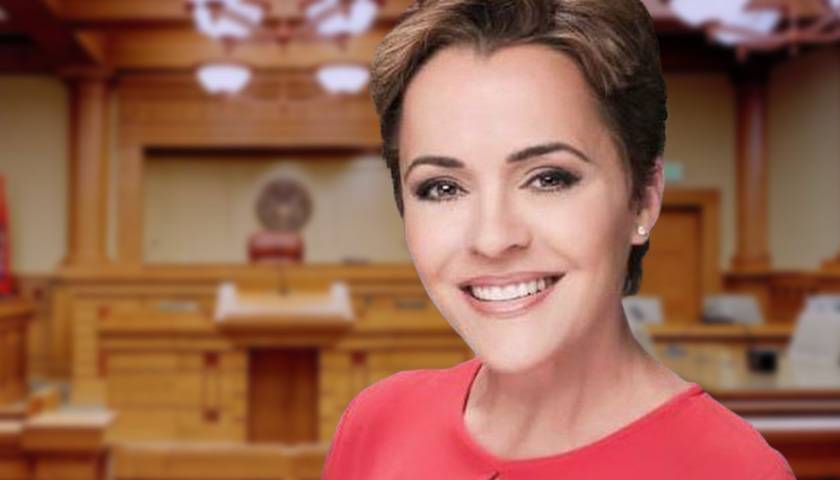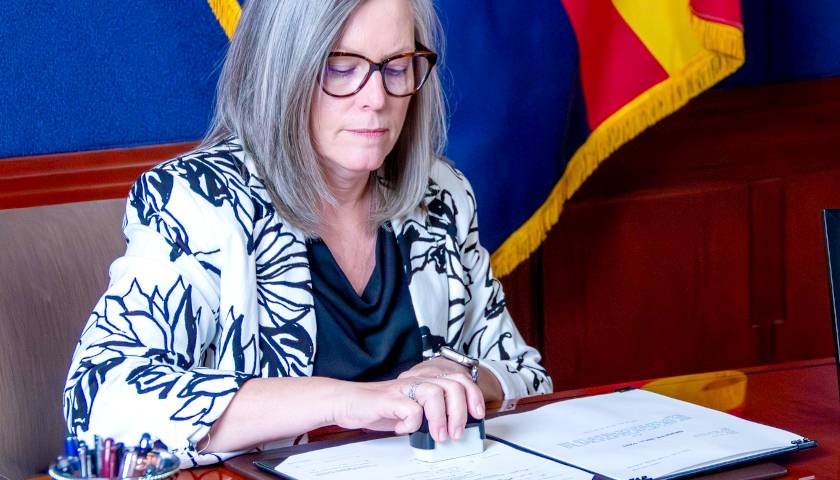The Arizona Supreme Court rejected part of the lower two courts’ rulings throwing out Kari Lake’s election contest, remanding it back to Maricopa County Superior Court Judge Peter Thompson for a new trial, but there are concerns Thompson will not provide a fair trial. One attorney who specializes in Arizona election law told The Arizona Sun Times that due to the perception that Thompson might be biased, he should consider recusing himself if he cannot otherwise overcome that perception of bias.
The attorney said, “The courts rarely rule in favor of these Republican election challenges, so the fact that both the Arizona Supreme Court and the Arizona Court of Appeals reversed some of Thompson’s opinion raises a concern that Thompson may have overreached, overstepped, and some may believe that’s a sign of bias.”
He offered Thompson a choice: “And unless he believes he can overcome that concern with not only assurances of fairness, but actual rulings guaranteeing fairness to Lake including access to ALL requested signature verification discovery, then he should seriously consider recusing himself; otherwise, it may hurt the chances of him providing a fair trial if he doesn’t and it turns out he’s biased.”
The attorney concluded, “Remember, everyone across the country is watching this case. He should do the right thing either by guaranteeing fairness, or put everyone at ease by removing himself.”
It would not be unusual for a judge to recuse himself or reverse himself in an election case. In April 2020, Maricopa County Superior Court Judge Christopher Coury recused himself from a legal proceeding involving the Maricopa County ballot audit. He had previously ordered the Democratic Party to pay a million dollar bond to stop the recount, but Democrats refused to pay it.
Last year, Maricopa County Superior Court Judge Joseph Mikitish reversed himself on allowing a voting-related initiative to make the the ballot after the Arizona Supreme Court ordered him to explain how he’d concluded that it qualified. The progressive initiative would have rolled back Republican-backed election law changes. Mikitish’s new ruling held that there weren’t enough valid signatures.
Given the wave of State Bar complaints filed against election attorneys in Arizona and in other states by Democratic operatives, other attorneys contacted declined to go on the record, fearing reprisals.
The 65 Project, which acknowledges it seeks to disbar conservative attorneys, has filed bar complaints against four of Kari Lake’s attorneys. A judge awarded sanctions against Mark Finchem and his attorney for challenging his election loss in the Secretary of State’s race. Both Lake’s and Finchem’s attorneys were sanctioned by a judge for filing a lawsuit last year challenging the use of electronic voting machine tabulators in elections.
Thompson wrote a short opinion – eight pages – and allowed two days for trial to cover all the evidence and witness testimony. He refused to hear eight of Lake’s 10 claims, and denied her bid to inspect 50 random early ballot envelopes for signature verification issues. The Arizona Court of Appeals rejected some of his opinion, and now the Arizona Supreme Court has ordered him to reconsider the signature verification issue.
Ryan McPhie, an attorney in Mesa, posted on the Avvo website for attorneys, “A judge SHOULD recuse themselves if there can be even an appearance of a conflict or possible bias. However, not all judges agree or understand this.”
A.R.S. 12-409 states that a party in a civil action in superior court can get a change of judge if they have “cause to believe and does believe that on account of the bias, prejudice, or interest of the judge he cannot obtain a fair and impartial trial.”
Rule 81, Canon 2.2 of the Arizona Rules of the Supreme Court states that “A judge shall uphold and apply the law, and shall perform all duties of judicial office fairly and impartially.” Rule 81, Canon 2.3 of the Arizona Rules of the Supreme Court states that “A judge shall perform the duties of judicial office, including administrative duties, without bias or prejudice.”
In State v. Curry, the Arizona Court of Appeals stated that “opinions formed by the judge on the basis of facts introduced or events occurring in the course of the current proceedings, or of prior proceedings … constitute … bias or partiality… [if] they display a deep-seated favoritism or antagonism.”
An advisory opinion issued by the Arizona Supreme Court stated, “[T]the Code of Judicial Conduct places a continuing and affirmative duty on the judge to recuse himself or herself from any proceeding in which his or her ‘impartiality might reasonably be questioned.’”
The opinion went on, “The most difficult situation is where a judge believes that the specific allegations in a complaint are untrue yet still believes he or she can continue to act with impartiality in the proceedings. Here the judge must apply the standard of objective reasonableness. It is not a question of whether the judge thinks he or she can be objective, but rather would an objective, disinterested observer reasonably question the impartiality of the judge.”
The opinion emphasized that a judge should recuse himself not just when there is impropriety, but even if there is merely “an appearance of impropriety.”
Where the legal proceeding is a new “action,” such as a new trial, the courts have held that the time to request a different judge starts over again. In Hofstra v. Mahoney, the Arizona Court of Appeals considered allowing a change of judge in a request for modification of alimony. The court referenced how this takes place with cases remanded for new trials, “Certainly if the right to change of judge is to be afforded in a new trial where all of the same factual and legal issues are to be relitigated, then that same right ought to be afforded in a modification hearing where none of the same issues can be relitigated.”
In Hendrickson v. Superior Court, where a new trial had been ordered due to a mistrial, the Arizona Supreme Court held, “the claimed after-discovered facts, if true, would warrant affiant as a reasonable person in honestly believing she would not obtain a fair and impartial trial and the application for substitute judge was made upon discovery of such facts, the same should be granted.” Similarly, in State v. Neil, the Arizona Supreme Court stated that a judge could be disqualified from hearing a new trial for being “biased and prejudiced.”
In Marsin v. Udall, the Arizona Supreme Court stated, “The right to a fair and impartial trial before a fair and impartial judge is a valuable substantive right originating in the common law and recognized by statute in both criminal and civil cases.”
The U.S. Supreme Court said in the case In re Franciscus, “A judge or justice of the peace in fulfilling his judicial function must not only strive to insure fair treatment toward every individual who appears before him, but he must also present the appearance of fairness and probity in his behavior as a judicial officer. If that appearance falters, the confidence of the public will naturally wane.”
Ryan Heath of The Gavel Project filed a lawsuit against Thompson in January, asking the court in a writ of mandamus to require Thompson to vacate his ruling and award the election to Lake. He pointed out that Thompson did not consider Reyes v. Cuming, a 1997 Arizona case involving similar circumstances — where similar to the problems in last fall’s election — signatures on the envelopes were not compared to the voter registration list, which violated a non-technical statute. That alone was enough to cast “uncertainty” of the results, the court ruled.
Thompson required showing by clear and convincing evidence that the misconduct was intentional and meant to change the election, was performed by one of the appropriate people in charge, and that it changed the election. In February, the Arizona Court of Appeals upheld Thompson’s dismissal of Lake’s case but rejected Thompson’s intentional standard.
That court said in its opinion, “Lake contends that the superior court erred by defining ‘misconduct’ under § 16-672(A)(1)as requiring proof that an elections official intended to improperly affect the result. We agree that there may be circumstances under which something less than intentional misconduct may suffice. Cf. Findley, 35 Ariz. at 269 (explaining that ‘honest mistakes or mere omissions’ are insufficient to invalidate an election ‘unless they affect the result, or at least render it uncertain’).”
A judge dismissed Heath’s lawsuit, but directed him to file it as an amicus curiae brief in the case instead, which he did. The Arizona Supreme Court appeared to agree with Heath in its decision, by remanding the signature verification challenge of Lake’s lawsuit to Thompson to redo.
– – –
Rachel Alexander is a reporter at The Arizona Sun Times and The Star News Network. Follow Rachel on Twitter. Email tips to [email protected].
Photo “Kari Lake” by The Kari Lake. Background Photo “Courtroom” by Carol M. Highsmith.






I Smell a Soros oaid Rat here, possibly more than one.
When Lawyers are afraid of reprisals you have your question of whether or not the Judge can be fair.